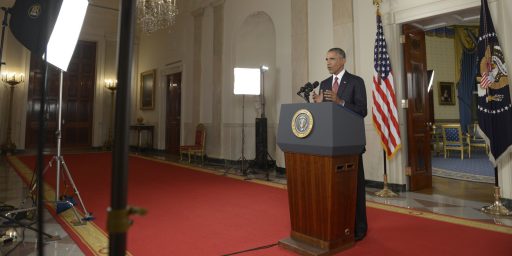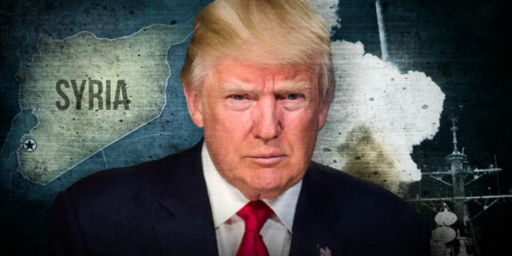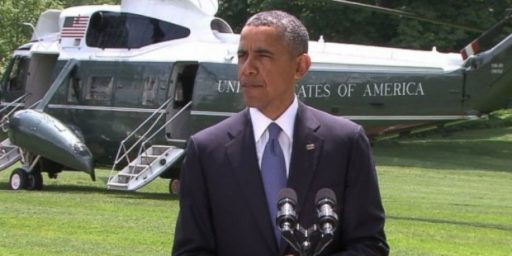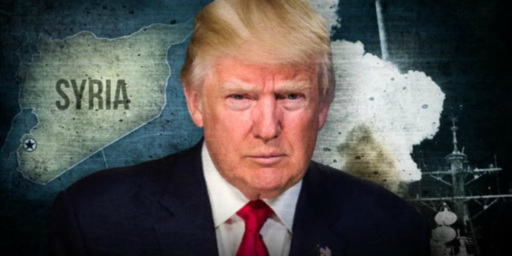Attacking Syria Without Congressional Authorization Would Be Illegal
Without Congressional authorization, any attack on Syria would be illegal, but don't expect Congress to do anything about it.
Last weekend’s apparent chemical weapons attack in Syria and the President apparent desire to retaliate in some manner in much the same way that he did a year ago, attention is once again turning to the question of what role, if any, Congress needs to play in connection with any military action that the United States may take against the Assad regime. Some members of Congress, such as Senators Tim Kaine and Rand Paul, have said repeatedly over the past several days that if the President is going to act he needs to come to Congress to seek authorization to use force in much the same way that it did prior to acting in response to the September 11th attacks and in advance of the Iraq War in 2003. Others, however, have contended that the President doesn’t need any additional authority to act, and Speaker of the House Paul Ryan is among them:
House Speaker Paul Ryan (R-Wis.) said Thursday that President Trump has broad authority to attack Syria, precluding the need for Congress to act beforehand.
“The existing AUMF gives him the authority he needs to do what he may or may not do,” Ryan said during a press briefing in the Capitol.
The Pentagon is currently operating under a 17-year-old authorization for the use of military force (AUMF) approved in the immediate wake of the 9/11 attacks. A number of lawmakers from both sides of the aisle have pushed for years for Congress to pass an updated AUMF, reflecting the expanding geography and evolving enemies that have marked the war against terrorism since 2001.
House Minority Leader Nancy Pelosi (D-Calif.) is among them.
Breaking sharply with Ryan, she argued Thursday that Trump must come to Congress to seek approval for new strikes against Syria, as the administration contemplates its response to last weekend’s chemical attacks in a Damascus suburb, which reportedly killed at least 40 people.
“Our members believe, as do I, that we need a new AUMF,” she told reporters in the Capitol, just moments before Ryan took the same podium to argue the opposite position.
Pelosi was among the many lawmakers who approved of missile strikes against a Syrian airfield in April 2017, which Trump initiated as a direct response to a deadly chemical attack on civilians days before. Outside of a similarly “proportionate” engagement, Pelosi said, Trump will need congressional approval.
“What he did last year was proportionate. They went in in the spring, they made a hit on a Russian facility, it was proportional. Anything beyond that, he will need a new authorization for the use of military force.”
Ryan, echoing the concerns of many Republicans in his conference, warned that a new AUMF might prove too short a leash on the U.S. military to ensure the nation’s security.
“What I would hate to do in this time when we have asymmetric threats across the globe, particularly with ISIS, is to have an AUMF that ties the hands of the military behind their backs,” Ryan said. “The last thing I want to see is an AUMF that makes it much more difficult for our military to respond to keep us safe, because they have the authority to do that right now.”
Ryan’s position is hardly a surprise, of course, since it mirrors the position that the Trump Administration has taken regarding the current presence of American troops in Syria and the apparent decision to keep those troops in place notwithstanding the fact that their primary goal, the apparent destruction of ISIS as a viable fighting force, has seemingly been accomplished. This is also basically the same position that the Obama Administration took when it sent American advisers and troops to Syria in the past when the fight against ISIS was still in its infancy. It’s a position that depends on interpretations of the resolutions that were passed by Congress more than a decade and a half ago to authorize something that was clearly not within the contemplation of any of the members who voted on the measure, many of whom aren’t even in Congress anymore.
According to these interpretations, the Obama and Trump Administrations have argued that their actions were and are authorized by what is, to say the least, a very generous legal interpretation, of the Authorization for Use of Military Force that authorized the Afghan War aimed at al Qaeda and the AUMF that authorized the Iraq War. This argument relied on the argument that ISIS was in some sense an offshoot of al Qaeda in that it had originated as part of Al Qaeda in Iraq, which didn’t manifest itself until after the 2003 American invasion and the toppling of the regime of Saddam Hussein. Because of this, the argument goes, the fight against ISIS is part of the so-called “War On Terror” that began in October 2001. The Obama White House also took the position that the AUMF authorizing the Iraq War provided further legal justification for military action against ISIS due to the connections between ISIS and that war.
Even if you accept those arguments with respect to the action against ISIS, though, there is simply no way to interpret either document to authorize either a continued military presence in Syria that is separate an apart from the fight against ISIS or an attack on the Syrian government for the use of chemical weapons. Given that, it seems clear that such action would be illegal and unconstitutional absent Congressional authorization. Unfortunately, it seems as though nobody in Congress cares about this issue outside of Senators Kaine and Paul and apparently House Minority Leader Nancy Pelosi, and most of the members of Congress will most likely be content to let the President potentially commit the nation to yet another war without a foreseeable end or a winnable objective.
As I’ve discussed before, none of this is new, and Ryan’s comments are hardly surprising given the long history of Congressional appeasement and shirking of its Constitutional duty when it comes to war powers and foreign policy Since at least the end of the Second World War and arguably well before then, Congress has slowly ceded whatever authority it had over American foreign policy and the power to commit military forces to unlimited missions to the Executive Branch. As a result it’s hardly surprising that Presidents of both parties have felt free to step into the gap and act in whatever manner they see fit while giving mere lip service to those parts of the Constitution that clearly vest Congress with the power to declare war and the authority to fund, and presumably defund, military missions and operations. The Korean War, for example, was justified by claiming it was conducted under the authority of the United Nations, and neither the Truman nor Eisenhower Administrations felt any apparent need to seek a formal declaration of war from Congress. The same can be said of the Vietnam War, which was preceded by a gradual increase in the number of American advisers and troops in South Vietnam that began long before the Gulf of Tonkin incident in 1965 to the point where the United States had become so committed that backing out was no longer a viable option.
There was some effort by Congress to push back on this usurpation of its authority after the Vietnam War in the form of the War Powers Act, which purports to place limits on the President’s ability to unilaterally commit troops. However, that law has been largely ignored by subsequent Presidents, and Federal Courts have declined to accept cases brought by Members of Congress pursuant to the law in response to events such as the deployment of American troops in places such as Lebanon or the commitment of American forces to conflicts such as the civil wars in what used to be Yugoslavia. This pattern has become even more apparent in the wake of the September 11th terrorist attacks. In the sixteen-and-a-half years that have followed those attacks, three successive Presidents have used the fig leaf of the October 2001 AUMF and the 2002 AUMF authorizing the Iraq War to justify intervention well beyond what was originally contemplated. The result now is that the United States finds it fighting a “War On Terror” across not just the entire Middle East, but in other parts of Asia as well as in Africa. As a result, there are American forces on the ground, and American drones in the air targeting alleged terror targets, in nations spanning an area from Affghanistan, Iraq, Syria, and Yemen to African nations such as Djibouti on the Horn of Africa and Niger in western Africa. With ISIS and al Qaeda now apparently engaged in exploiting the chaos that ongoing military operations have created in places such as Yemen, Syria, and Libya, those commitments are only likely to expand further and the likelihood is that American troops will increasingly come to find themselves in conflicts in nations most Americans have never heard of for reasons that our leaders don’t even bother to explain.
This isn’t entirely the fault of Presidents, of course. As Matthew Yglesias said in a blog post written years ago:
The one observation I would make about this, is that while the trend toward undeclared military incursions is often described as a kind of presidential “power grab” it’s much more accurately described as a congressional abdication of responsibility. Even if you completely leave the declaration of war business aside, congress’ control over the purse strings still gives a determined congressional majority ample latitude to restrain presidential foreign policy. The main reason congress tends, in practice, not to use this authority is that congress rarely wants to. Congressional Democrats didn’t block the “surge” in Iraq, congressional Republicans didn’t block the air war in Kosovo, etc. And for congress, it’s quite convenient to be able to duck these issues. Handling Libya this way means that those members of congress who want to go on cable and complain about the president’s conduct are free to do so, but those who don’t want to talk about Libya can say nothing or stay vague. Nobody’s forced to take a vote that may look bad in retrospect, and nobody in congress needs to take responsibility for the success or failure of the mission. If things work out well in Libya, John McCain will say he presciently urged the White House to act. If things work out poorly in Libya, McCain will say he consistently criticized the White House’s fecklessness. Nobody needs to face a binary “I endorse what Obama’s doing / I oppose what Obama’s doing” choice.
The other important point, of course, is that what the Constitution says about war powers at this point is largely irrelevant, what matters is nearly 200 years of tradition and history, during which Presidential authority to engage in military action without getting direct Congressional approval has gradually, but incessantly, expanded. It started in 1801 when Thomas Jefferson essentially declared war on the Barbary States(located, ironically enough, in what we now call Libya) for their piracy against American military and merchant vessels. In that instance, Jefferson did inform Congress of his actions, and they did issue what some might call an authorization for the use of force against the pirates, but it occurred long after the time that the mission was launched and was presented to Congress as something of a fait accompli. Later, in the 20th Century, Presidents sent forces of various sizes of Latin American nations such as Nicaragua to put down rebellions or maintain control. Then, once the Cold War started, the instances of unilateral action by the President increased exponentially, starting with the Korean War, a three-year-long engagement that was never directly authorized by the United States Congress. And, of course, its worth noting that the bloodiest conflict in American history was an undeclared war. The fact that we’ve ended up where we are now, while distressing, is really just the inevitable result of more than two centuries of gradual Congressional abdication combined with an Executive Branch that was all too eager to assume new powers unto itself.
In this particular case, the fig leaf that the Obama and Trump Administrations have relied upon to justify military action against the Assad regime is clearly an illusion. Even if you accept the argument that the original post-9/11 AUMF authorized action against ISIS and al Qaeda far beyond the borders of Afghanistan, there is simply nothing in the text of that AUMF, or the one that authorized the Iraq War, that can legitimately be said to justify attacking the government of Bashar Assad. Assad was not part of the attacks on the United States on September 11th, and his government played no role in maintaining Saddam Hussein’s grip on power. As a matter of law, therefore, any attack on Syria that is not authorized by Congress beforehand would clearly be illegal, contrary to international law, and unjustified.
Sadly, comments like those from Speaker Ryan make it clear that there is nothing Congress will do about it.







I always find the Kaine/Rand complaint that the President “needs to come to Congress to seek authorization” infuriatingly disingenuous. Ditto for the argument from hawks in Congress that the President doesn’t need to ask. Either way, Congress doesn’t have to wait for the President to come ask for authorization; it can just proactively pass a bill granting such authorization if it wants to. Whether or not Congressional hawks believe it’s technically required under the Constitution, they could simply introduce a bill granting the President authorization to attack Syria if they think they have the votes for it. And on the flipside, although it’s somewhat counter-intuitive, if the Congressional doves in Congress think the votes aren’t there, they could introduce an authorizing bill specifically in the hopes that it gets voted down in order to increase the pressure on the President to not attack Syria.
This is nonsense. The AUMF doesn’t tie the hands of the military; it ties the hands of the politicians who direct the military.
I would like to point out that military action in Syria is not to keep us safe but to punish the Syrians.
@Scott: Pfft. Sounds like a Treasoncrat to me. Our troops always Protect Our Freedom. If it weren’t for whatever our glorious troops are about to do, or not do, if they didn’t do it, or didn’t not do it, you’d be speaking Syrianese, buddy.
The word is there won’t be a strike tonight. Apparently the Syrians and Russians need another day to hide all the stuff they care about.
I have no great objection to blowing up Assad’s people, per se, they deserve blowing up. But WTF is the strategy here? 48 hours ago Trump wanted to get out, fast. Then he was talked into staying. And now we’re escalating. Can someone explain the end point of that progression? Are we winning something? Do we want to?
As for the legalities, we should pause and enjoy the irony here. The AUMF was to fight Al Qaeda, then its presumed offspring, ISIS, and now we would be using that very same AUMF to justify our support of ‘our side.’ And who is ‘our side?’ Why, largely Al Qaeda, of course. Because: Middle East! Which to me justifies my belief that if the Russians want this mess, we should let them have it.
congress usually prefers the prez to act alone. there’s seldom any upside on a vote for them.
Ross Douthat has been reading the comments here. His new column is Why not impeach this trump bastard so we can haz Pence?
@R. Dave:
I’ll submit to you that congress critters don’t want to take the lead; perhaps they think that’s what the Commander in Chief’s role is…… to lead.
If Congress has reservations about the objectives, the strategy, the degree of committment etc, the leader should lay out the broad plan and the Congress can either approve or not.
Therein lies the problem, when the CinC has no plan, is unsure of the objectives, has no idea of the commitment (time, treasure and blood), is Congress to assume that role?
Technically, no. WPA permits the sitting president to commit forces to military action without the consent of Congress, provided he/she notifies Congress within 48 hours of doing so and the committed troops don’t remain actively committed in offensive operations for longer than 60 days.